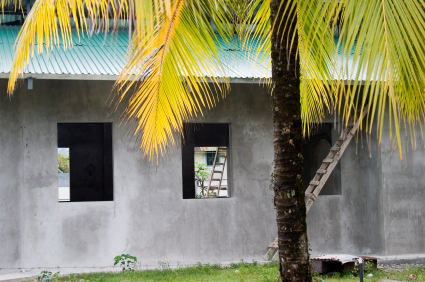Costa Rica: The Land without Mortgages

One of my favorite pastimes is traveling with my lovely bride of 35 years, Puddy. Several years ago, we traveled to Costa Rica for a business conference. Whenever we travel out of the country, I like to get a car and driver to drive us around for a day or so to point out little-known local places and items of interest. I enjoy the conversation as well as the local perspective.
As we toured the countryside, one of the things that struck me, was the number of partially completed cinder block houses. It was a mystery why so many houses had begun construction, yet appeared to be abandoned. There were not a lot of them, but there were enough to encourage me to ask about what I considered an oddity. Our driver and guide explained that mortgage loans were not readily available to most people in Costa Rica. If a young couple married and wanted to build a home, they purchased land outright, or their family gave it to them. The couple then saved their money, built a single room out of cinder blocks, and then moved into their new one-room home. Every payday, they would purchase as many cinder blocks as they could afford and start on the next room. The cinder block house would be built over a period of years as fast as their budget would allow. The use of cinder blocks allowed for exposure of the uncompleted room to Costa Rica’s hot and humid climate without damage. After many years, a simple but very nice home would be completed around an interior courtyard. The home thus would be completed without a bank mortgage and would be owned free and clear from day one.
Puddy and I both had a hard time trying to imagine the wanting and waiting. Our generation wants it all, right now! Most people of our generation not only mortgage their house but also the drapes and some of the furniture as well so they can move into a “completed” home. Of course, they then spend the rest of their lives paying for it. And we are supposed to be from the “advanced” country.
Also interesting were the ornamental iron burglar bars on nearly all the houses as well as the elaborate iron gates and fences that surrounded them. In spite of everything I had read about the country’s low crime rate, I concluded that the crime rate must be very high indeed, at least in the rural areas, and once again I was proved flat wrong. Our driver told us that the Costa Rican government controlled the insurance companies, and that insurance was too expensive for most people to purchase. Homeowners simply chose to protect their property themselves instead of purchasing overpriced insurance. We in the United States, on the other hand, leave much of our property unsecured or only partially secured and insure it against loss. Once again I wondered which country was more advanced.
The unofficial national vehicle also interested me. It seems the most popular vehicle in the country is the old FJ40 Toyota Land Cruiser. The vehicle particularly caught my eye because of the FJ40 my son and I restored some years ago from parts sourced from three different vehicles. Unlike many Americans, Costa Ricans do not “need” a new vehicle every couple of years but instead lovingly maintain their old Cruisers year after year so that they are every bit as nice as our restored one. I guess they do not have a car note, either.
We in the United States could live in the land of “no mortgage,” too, if we were not so eager to possess material goods and to possess them now.
Latest posts by Larry LaBorde (see all)
- Should I Buy My Dream Home Now? - April 1, 2015
- Pray for $500/oz Gold - October 24, 2013
- Cry for Argentina - October 22, 2013
Larry LaBorde's ArticlesSep 1st, 20060 comments
Contact Us
24 Hour Spot Prices
Change Bid Ask {{item.name}} {{item.change}} {{item.bid}} {{item.ask}}
Product Prices These are our most commonly sold products, but we have many more!
Hover over product to see pricing.
|
{{product.name}} (*) (**)
US Price: ${{getPrice(product)}} Price Outside US: ${{getPrice(product, 'non_us')}} Ounces: {{product.oz}} |
* (15 oz foreign Min) ** (When available)

